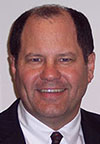
Brian Lynch of Advantage Systems: The Mortgage Industry Has a Talent Problem That Demands Operational Change To Overcome
Brian Lynch is President of Irvine, Calif-based Advantage Systems, a provider of accounting and financial management tools for the mortgage industry. More information on the company can be found at www.mortgageaccounting.com.

Prior to 2020, the mortgage industry was already facing a serious staffing problem with experienced baby boomers retiring and fewer new entrants into the industry taking their place – a lingering effect of the Great Recession. Lenders, supporting vendors and even government agencies like FHA were all struggling with how best to combat the “brain drain” that was underway.
The pandemic has only exacerbated the problem – specifically the ongoing effects of the Great Resignation with younger mortgage professionals and experienced ones alike choosing to leave the industry in record numbers. And those that have remained now have a different expectation about how, and where, work takes place. Workers are recognizing that they now have more leverage in the marketplace and what were once considered perks, like working from home and flexibility in scheduling, are now expectations.
This shift is forcing lenders to reconsider how they manage business continuity, attract talent and retain that talent. Paired with a rising rate environment that is causing lower loan volumes, this has created a necessity for lenders to intelligently automate in order to remain competitive within an evolving market.
For today’s lenders, success is tied to flexibility, and intelligent automation often leads them into the cloud. Because of its distributed nature and the involvement of large, enterprise providers like Amazon (AWS), Google (Google Cloud Platform) and Microsoft (Azure), the cloud is well suited to support the operational demands of modern lenders within a highly secure environment, while also providing them with increased levels of flexibility in how they manage both their staff and their data. Cloud-based solutions provide lenders with more control over their technology and the ability to customize that technology to suit their specific processes and workflows.
Particularly in today’s age of remote and/or hybrid office structures, the cloud is adept at supporting highly secure, stable, scalable frameworks that individual staff, and even entire departments, can utilize to more effectively collaborate from locations across the country (or around the globe) if the lender chooses.
The challenge for lenders is in recognizing that some areas of the business stand to benefit more from automation and tend to function better in a remote officing environment than others.
Take accounting for example. As a discipline, accounting often serves as an end point for a host of activities and initiatives that have already happened. Lenders want to know how many loans are in the pipeline, how many loans have successfully closed, how many failed to close and why. They need data to evaluate the performance of their branches and the individual loan officers within those branches. Based on this performance data, lenders need an efficient way to then quickly and accurately compensate those branch managers and their staffs.
Years ago, a company’s financial data would have only been accessed by those in the accounting department. Today, that data is routinely reviewed by any number of department heads, branch or regional managers and even C-level executives, in addition to those in the accounting department. The cloud is the ideal platform to serve that data to all who need it. From dashboards that provide managers with key performance data to assist them manage their respective cost centers, to timely financials that the user can drill into to analyze what’s really going on. If the devil’s in the details, then you need access to those details.
In today’s remote or hybrid workforce environments, the cloud is providing lenders with the flexibility to have staff work from wherever they want. The pandemic has shown that even accounting personnel can work from home. Paper invoices have been replaced by PDFs and checks have been replaced by ACH transfers and other electronic methods of payment, leading to a more paperless environment that requires fewer people to physically be in the office to manage. This ability to support remote officing has also widened the search area for personnel, giving those companies far greater choice to find – and more importantly, retain — the right people, regardless of location.
The key moving forward lies in automating where it is most effective, widening the net in terms of attracting talent and then maximizing that talent by providing them with the right tools and user experience to drive business.
(Views expressed in this article do not necessarily reflect policy of the Mortgage Bankers Association, nor do they connote an MBA endorsement of a specific company, product or service. MBA NewsLink welcomes your submissions. Inquiries can be sent to Mike Sorohan, editor, at msorohan@mba.org; or Michael Tucker, editorial manager, at mtucker@mba.org.)
